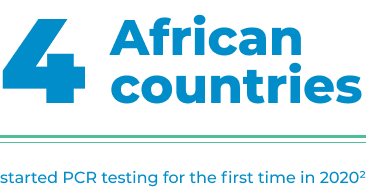Report of the Regional Director 21 - Chapter 4
Report of the Regional Director - 2021 - Chapter 4

Integrated action and
innovations for health
To support Member States in attaining UHC, WHO is investing in areas that cut across health programmes. These are innovation, digital health, research, laboratory services, health information, primary health care and antimicrobial resistance.
Promoting innovation,
including digital health and research
Innovations for COVID-19 and beyond
In the African Region, WHO has mainstreamed the innovation agenda into the core of health service delivery. WHO has supported the scaling-up of 17 new tools profiled in the inaugural WHO Innovation Challenge in 2018. These innovations covered a wide range of areas that includes maternal and child health, mental health, access to reproductive services for adolescents, health worker training, care for older people, health information systems, and diagnostics. WHO played a critical role by advocating for the innovations to be leveraged in addressing pertinent health challenges. We created a robust digital innovation marketplace to generate demand, match-making and to raise visibility among potential funders. The innovation marketplace has since surpassed one million subscribers, including funders, private sector partners, policy-makers, innovators and civil society groups. We have also provided training for innovators on intellectual property management in collaboration with the International Federation of Pharmaceutical Manufacturers and Associations (IFPMA).
Innovation has played a central role in the COVID-19 response, including the vaccine roll-out. The WHO Regional Office took the lead in establishing global databases of more than 2000 technological innovations deployed for the COVID-19 response as well as COVID-19 vaccine delivery.
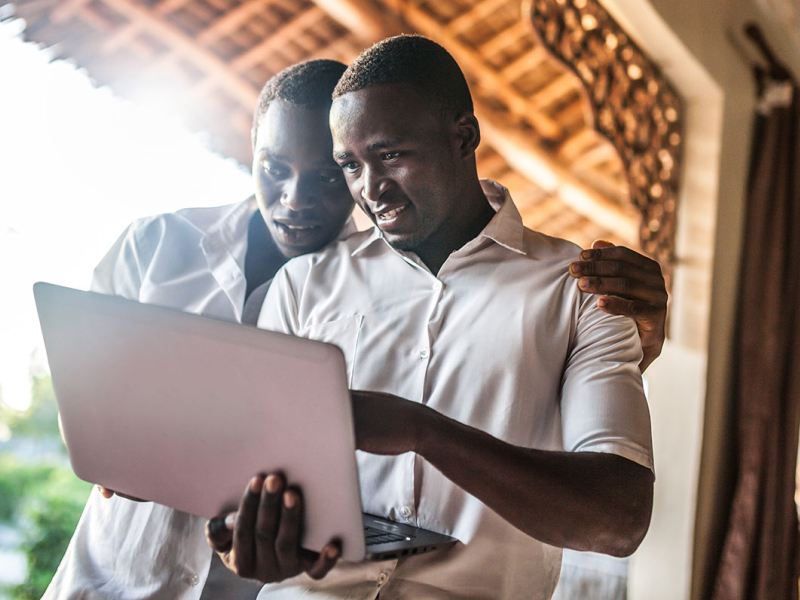
Innovation has played a central role in the COVID-19 response, including the vaccine roll-out. The WHO Regional Office took the lead in establishing global databases of more than 2000 technological innovations deployed for the COVID-19 response as well as COVID-19 vaccine delivery. Through this initiative, many countries are using these databases as references for identifying innovations for adoption and adaptation in their context as part of their COVID-19 response strategy. South Sudan and Lesotho have since rolled out a self-assessment mobile and web-based application for screening COVID-19 that is being used by community health workers countrywide. Furthermore, WHO developed a compendium of innovative best practices that was shared with all the countries.
Digital health as the path to the future
Many countries have developed or acquired digital tools to help manage the pandemic, including for monitoring patients and asymptomatic cases, contact tracing, and vaccination management.
Accelerating the pace of research
To improve understanding of key areas such as COVID-19 epidemiology, transmission dynamics, clinical characterization of cases, drug and vaccine clinical trials, and social and behavioural insights, WHO developed generic research protocols to facilitate accelerated research. Twenty-seven countries implemented at least one of the protocols.
Ethiopia, South Sudan and Zambia have published the preliminary results. In Zambia the estimated prevalence was 10.6% and the study revealed that transmission among health workers was happening in the community rather than in health facilities. In Juba, the prevalence estimate was 22.3% and in Ethiopia, with a sample size of 648 participants, it was estimated to be 3.2%.
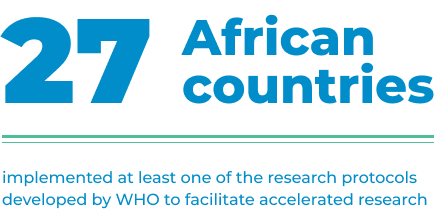
The African Advisory Committee on Health Research and Development (AACHRD) supported young scientists from 20 African countries in a mentorship programme to develop scientific papers on innovative ways of attaining UHC and the SDGs. Twenty papers have since been published online and compiled into a supplement, which has been shared with policy-makers across the Region.
Rapidly enhancing laboratory services
The COVID-19 pandemic has shone a light on the importance of laboratory services, with emphasis on testing. In the space of a few months, with the support of WHO and other partners, diagnostic capacities for COVID-19 increased from only two countries (South Africa and Senegal) to all 47 countries in the Region.
Laboratory workforce capacities have also been enhanced through training on diagnostic device selection, national approval, listing and use. Ten PCR machines, two biosafety cabinets, three portable glove boxes and two autoclaves were procured for African countries.
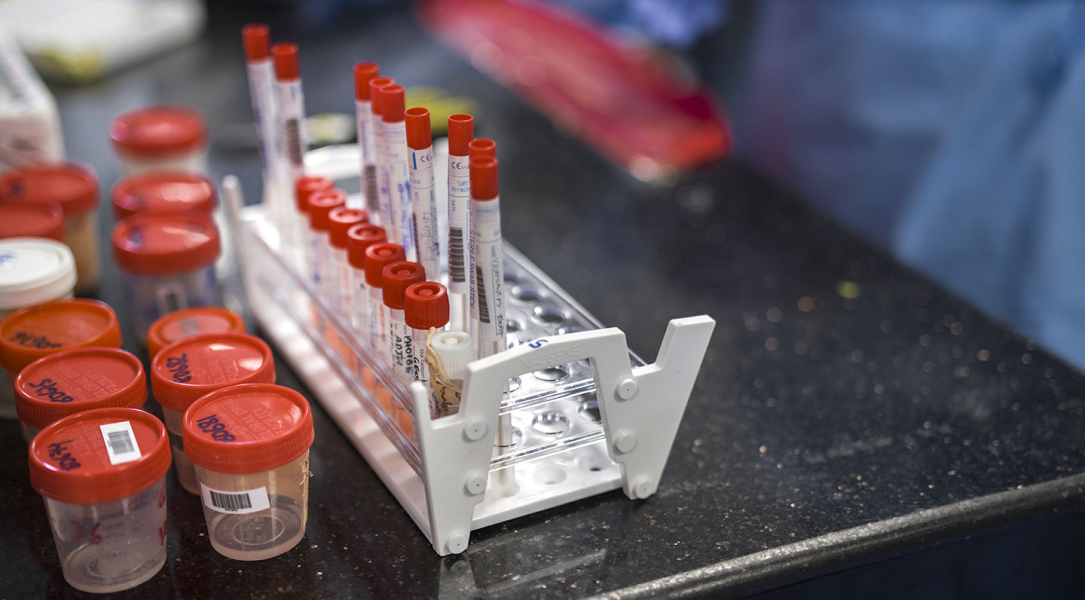
WHO is supporting countries that lack sequencing capacity by offering technical guidance and providing laboratory supplies. WHO encourages all countries to ship at least 20 samples per month to sequencing laboratories to be able to accurately monitor the presence, prevalence and spread of circulating variants.
The use of antigen-detecting rapid diagnostic tests (Ag-RDTs) for COVID-19 as a cheaper but reliable, easy-to-use and decentralized, fast alternative to PCR is being scaled up. Seven sessions have been held to train health workers on how to use ag-RDTs. These sessions brought together more than 500 participants from 35 countries. So far, more than 20 countries are using ag-RDTs and 12 are reviewing their policies on ag-RDT use. The introduction of these tools has helped to double the regional mean number of COVID-19 tests from 161 per 10 000 population to 333 per 10 000 population cumulatively in the space of six months.
Working with regional experts, WHO is assessing the status of medical imaging and biomedical equipment maintenance services, facilities and capacities in the Region.
Improving the availability and
quality of information for action
In response to COVID-19, WHO created a real-time surveillance platform to enable African countries to monitor service continuity and track disruptions. The dashboard currently displays data from 27 countries, 186 provinces, 1027 districts, and 6975 health facilities.
In partnership with the London School of Economics and Political Science, the European Observatory, and supported by grants from the Bill & Melinda Gates Foundation, WHO has launched the African Health Observatory - Platform on Health Systems and Policies within the iAHO. Centred on the theme of re-engineering service delivery systems for UHC, the platform streamlines access to global knowledge to improve health systems development focusing on primary health care. The initiative has been launched in five countries6 through national centres that produce policy briefs, country health system and services profiles, comparative studies, and policy dialogue events.
Catalytic support for the operationalization of the Global Action Plan for Healthy Lives and Well-being for All has been provided to support improved stakeholder harmonization across Member States, particularly around data governance. Five countries7 have created health data collaboratives towards improving the availability of quality data for local decision-making and tracking progress towards the health-related Sustainable Development Goals.
Increasing access to
quality primary health care
Primary health care is central to attaining universal health coverage and WHO has worked with countries to advance this approach in a variety of ways.
In South Africa, WHO and other partners provided technical support to ensure that there are provincial and district plans to track defaulters and generate sustained demand for routine immunization services. The data indicates that there was an improving trend in the immunization coverage from May to August 2020. In Ghana, immunization performance steadily increased between June to August 2020. WHO supported the Ghana Health Service and the Ministry of Health to ensure continuity of service provision for mothers and children.
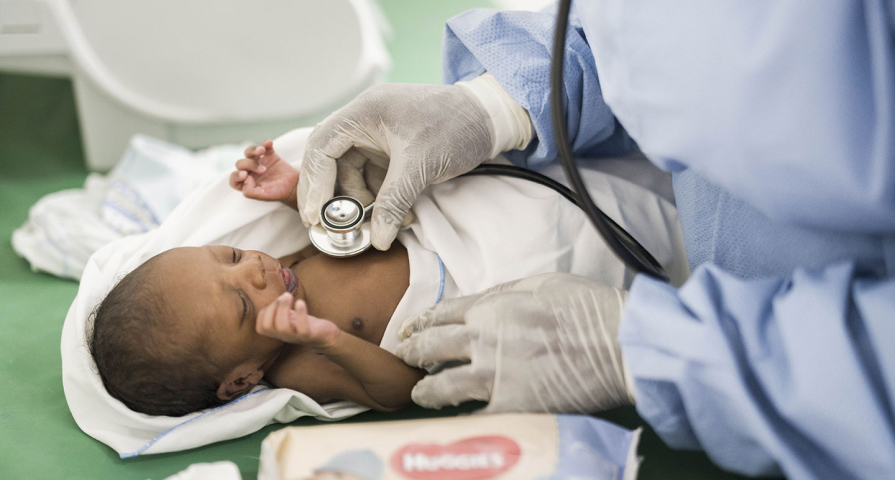
Eswatini is assessing the status of implementation of primary health care to guide the development of a new strategy. Infection prevention and control assessments in Eswatini, Gabon and Zimbabwe have led to the development of guidance documents.
In Botswana, a training needs assessment is underway to build the capacities of 60 newly appointed District Health Management Team (DHMT) members and 20 public health specialists. Namibia and Zanzibar have finalized their national quality policy and strategy (NQPS) and operational plans.
Combating antimicrobial resistance
Analysis of national COVID-19 clinical management protocols in African countries in January 2021 revealed that 53% recommend antibiotics (mainly Azithromycin) for mild cases and 80% recommend antibiotics for moderate cases. This is concerning and highlights the need for increased vigilance and stewardship to reduce the incorrect use of antibiotics.
Over 140 regulators in African countries are among the first in the world to have been trained on how to embed antimicrobial resistance (AMR) into inspections and to guide the pharmaceutical industry to contribute to AMR prevention.
In 2020, WHO, FAO, the World Organisation for Animal Health (OIE), the African Union and Africa CDC commemorated the second continental Antimicrobial Awareness Week with over 1200 participants and 1.2 million Twitter impressions.
Engagement with civil society groups is also increasing, for example, with the Dr Ameyo Stella Adadevoh (DRASA) Health Trust, a project on AMR behaviour change is being implemented in secondary schools in Lagos State in Nigeria to improve hygiene and sanitation.
Work with Africa CDC is ongoing to develop a legal framework for the African Union on the implementation of national infection prevention and control programmes. This will help African countries to develop a model public health law and legal framework for infection prevention and control.
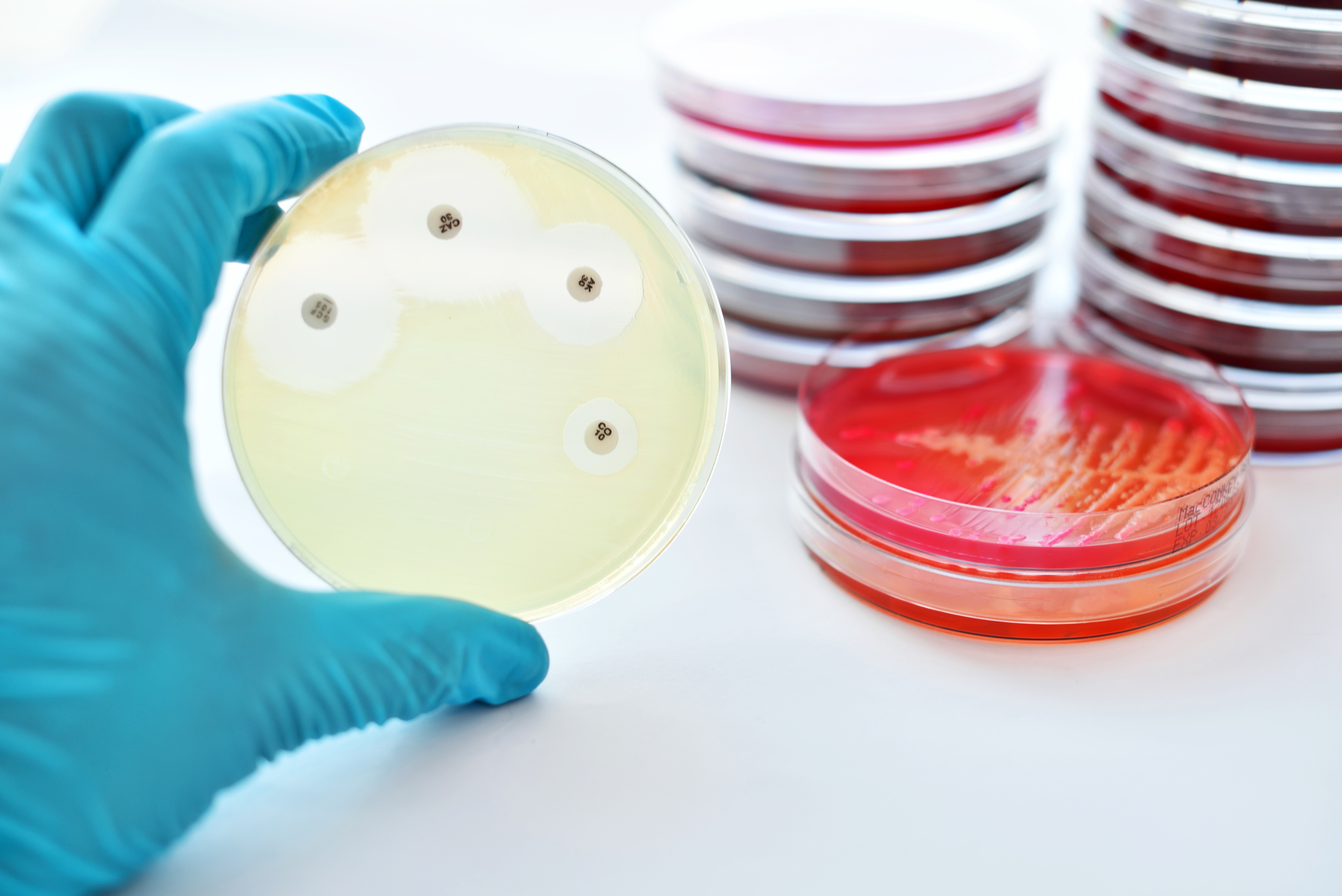
Six more countries8 have enrolled in the WHO Global AMR Surveillance System (GLASS),9 bringing the total number of African countries to 30.10 Togo implemented a mentorship programme for 10 public and private microbiology laboratories to enhance the quality of antimicrobial susceptibility testing. After three months, the average of non-compliant practices dropped from 50% to 9% and a private clinic has renovated its microbiology laboratory to meet standards.
Burundi and Guinea approved their multisectoral national AMR plans, bringing the total number of countries with endorsed plans to 22 in the Region.11 Nineteen countries12 participated in the fourth round of the global annual Tripartite AMR Country Self-Assessment Survey (TrACSS) to evaluate country progress in the implementation of the Global Action Plan on Antimicrobial Resistance (AMR). The survey found that most countries have begun to integrate AMR training for health workers. Seven13 out of 19 countries responding to the survey have amended their national AMR strategy for human health based on antimicrobial consumption and resistance data.
- Workshop on Regulation of Medical devices including IVDs: Focus on technical files approaches and Post Market/Market Surveillance for COVID-19 assays (22-25 February 2021, 1-2 March 2021).
- Comoros, Eritrea, Lesotho, and Sao Tome and Principe.
- Angola, Botswana, Cameroon, Comoros, Côte d'Ivoire, Democratic Republic of the Congo, Equatorial Guinea, Eswatini, Ghana, Guinea-Bissau, Kenya, Lesotho, Madagascar, Malawi, Mauritius, Mozambique, Namibia, Rwanda, Seychelles, South Africa, United Republic of Tanzania, Togo, Uganda, Zambia, Zimbabwe.
- Algeria, Angola, Cabo Verde, Cameroon, Central African Republic, Côte d'Ivoire, Democratic Republic of the Congo, Gabon, the Gambia, Ghana, Guinea, Guinea-Bissau, Kenya, Libya, Malawi, Mauritius, Morocco, Niger, Nigeria, Congo, Rwanda, Senegal, South Africa, Togo, Tunisia and Uganda.
- Algeria, Botswana, Democratic Republic of the Congo, Ghana, Kenya, Morocco, Nigeria, South Africa and Uganda.
- Ethiopia, Kenya, Nigeria, Rwanda and Senegal.
- Botswana, Cameroon, Kenya, Malawi and Uganda.
- Angola, Burkina Faso, Cameroon, Democratic Republic of the Congo, Namibia and Togo.
- GLASS data is used to monitor emerging resistant pathogens and their potential international spread, thereby informing implementation of targeted prevention and control programmes.
- Algeria, Angola, Benin, Burkina Faso, Burundi, Chad, Cameroon, Côte d'Ivoire, Democratic Republic of the Congo, Ethiopia, Gabon, the Gambia, Ghana, Kenya, Liberia, Madagascar, Malawi, Mali, Mauritania, Mauritius, Mozambique, Namibia, Nigeria, South Africa, South Sudan, Togo, Uganda, United Republic of Tanzania, Zambia and Zimbabwe.
- Burundi, Cameroon, Chad, Congo, Democratic Republic of the Congo, Ethiopia, Gabon, Ghana, Guinea, Kenya, Liberia, Madagascar, Malawi, Mali, Mauritius, Mozambique, Nigeria, Sierra Leone, South Africa, United Republic of Tanzania, Zambia and Zimbabwe.
- Benin, Burundi, Burkina Faso, Côte d'Ivoire, Democratic Republic of the Congo, Eswatini, Ethiopia, Ghana, Guinea, Kenya, Liberia, Mauritania, Niger, Nigeria, Sierra Leone, South Sudan, United Republic of Tanzania, Zambia and Zimbabwe.
- Côte d'Ivoire, Democratic Republic of the Congo, Eswatini, Ethiopia, Kenya, South Africa and Zambia.



